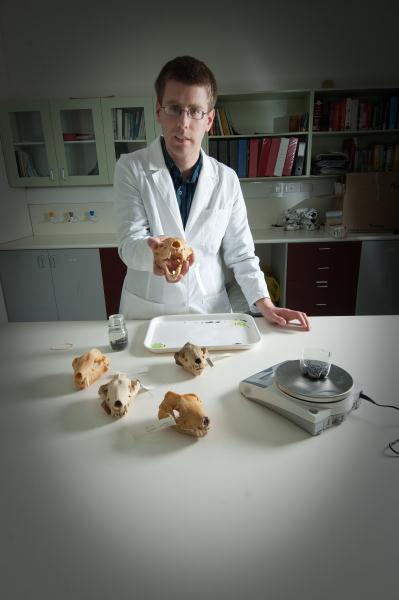
By ALESHA CAPONE
A VICTORIA University researcher is playing a role in efforts to keep an iconic Australian animal from extinction.
Doctor Patrick Guay works across the university’s Footscray, St Albans and Werribee campuses.
He has embarked on a long-term project with partners Zoos Victoria, the Zoo and Aquarium Association and Save the Tasmanian Devil Program.
The study will help verify whether the brains of Tasmanian devils get smaller, if they are bred in captivity across generations.
Recently Tasmanian devils have been battling the deadly Devil Facial Tumour Disease which has devastated their population.
Efforts to repopulate the species have concentrated on breeding the animals in captivity.
This is where Dr Guay’s research comes in – because if the brains of animals shrink while they are in captivity, this can diminish their natural survival instincts upon being released back into the wild.
“For me it is a way to make a difference for the conservation of Australian animals,” Dr Guay said.
“The big problem with captive breeding is that it is often thought of as the initial step of domestication which is known to cause irreversible brain size decrease.”
As part of his research, Dr Guay has studied the skulls of Tasmanian devils at the Queen Victoria Museum and Art Gallery in Launceston.
Dr Guay said his previous studies into ducks, swans and geese has shown their brain size can shrink by around 11 per cent while in captivity.
However, so far his work with marsupials has revealed their brains will not shrink if they are kept in an ‘enriched’ captive environment.
“What this suggests is that – if the animal is provided with an enriched environment similar to their natural environment where they have to find their own food – this decreases the chances of having their brains shrink,” Dr Guay said.
He said most scientists conducting research want to obtain significant results so they could publish their work.
“But in this particular case, getting no particular difference with wild and domesticated animals is what we are hoping for – although I am not trying to pre-empt the results at all,” Dr Guay said.
“If there is no change, in this case that is a good news story.”

